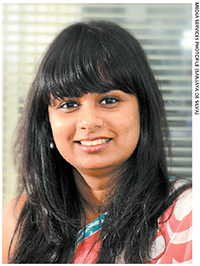BIZ COMMUNICATIONS
Compiled by Ayesha Reza Rafiq
RISING ABOVE THE CLUTTER
Ishani Ranasinghe extols the virtues of corporate communications
 It is an exciting time to be a communications professional. Traditional methods of corporate communications are being thrown out the window, and professionals are embracing groundbreaking and challenging methods of communicating and interacting with their audiences.
It is an exciting time to be a communications professional. Traditional methods of corporate communications are being thrown out the window, and professionals are embracing groundbreaking and challenging methods of communicating and interacting with their audiences.
“One of the most challenging aspects of the profession – locally, or elsewhere – is that it is constantly changing,” affirms Ishani Ranasinghe, who adds: “Disruptive technology, consumer empowerment and stakeholder scepticism of the media all come into play. Those of us working in the communications field have to adapt constantly, to find better ways to connect and communicate with the audience.”
Change is the catchphrase of most corporate strategies – and perhaps, nowhere more so than in the communications field, which is required to rapidly and effectively embrace all aspects of what is a fluid landscape of blurred lines and overlapping functions, to deliver 360-degree solutions that stand out for outstanding offerings.
“It’s a cluttered domain. At any given point, people are constantly bombarded with brand-related content. The challenge is to make your message stand out from the clutter,” Ranasinghe remarks.
She explains that the sector has come a long way from when it was considered the stepsister of marketing, and adds: “Marketing professionals initially couldn’t understand the need for an in-house corporate communications and PR department.”
“Marketing objectives were clearly defined: you could see where the money was spent, through increased sales and inquiries, which generated a real Return on Investment (ROI). But the ROI in communications was more difficult to calculate, and less tangible. It’s more difficult to measure how communications can provide a softer approach to building a brand’s image,” she elaborates.
Ranasinghe continues: “However, things have changed. People now understand the importance of a strong communications strategy – i.e. one that goes beyond the traditional press release, to combine traditional and non-traditional forms of engaging with stakeholders, to build a brand and protect the reputation of an organisation. Today, strategic stakeholder engagement is the single most important distinction between a successful and an unsuccessful brand.”
In fact, the profession’s role has grown so exponentially that “communications has become one of the most important ways of mapping out and engaging with a corporate’s vast network of stakeholders.”
The challenge is to ensure there are updated strategies to appeal to today’s consumers, who are more demanding of customer services, less loyal to brands and far more resistant to traditional marketing messages.
Given its pivotal role, the communications field needs professionals who possess a versatile and portable skills set, to deliver optimal results. The most pressing challenge for professionals is creativity. An evolving Gen Y market, which has evolved into having shorter attention spans and expecting immediate gratification, means that communications must learn how to grab their attention.
“From a communications standpoint, we need to connect with audiences in a more rapid and succinct manner,” Ranasinghe asserts. But doing so is no easy task, which is one of the reasons for communications being among the most demanding and stressful careers in the modern age.
In this context, the importance of ensuring educational and training opportunities that are in line with the demands of the job cannot be stressed enough, and is one area in which Sri Lanka lags behind. A lack of educational opportunities in this field means that prospective employees follow alternative programmes such as marketing.
Ranasinghe stresses that “it is important to have more programmes that cater to individuals who are interested in entering this field. In the communications arena, you gain knowledge and enhance your skills by working within the role. Thus, it is important that internships and training programmes are in place, to offer students an opportunity to explore this field, and gain the necessary knowledge and skills.”
A lack of such opportunities inevitably impacts the sector’s talent pool – and thereby, performance – she points out: “While we have skilled personnel, there aren’t many opportunities for these individuals to expand their knowledge and skills. For instance, we have a limited focus on providing further educational opportunities for those who wish to study for a bachelor’s or master’s degree in communications.”
As for performance, Ranasinghe is confident that the local communications profession is evolving rapidly. While it lags behind regional counterparts, this is not particularly relevant, as our performance – when taking into consideration lower budgets and less access to resources – is admirable.
Despite these restrictions, however, the sector is dynamic and thriving, and gradually gaining empowerment at the board level.





As Ishani emphasises, it pays for a company to devise a holistic corporate communication strategy, considering both traditional communication media and digital channels. Also, millennials in the audience, with their exacting demand for brevity and clarity, do compound the problem.
From my personal experience of seven years in the field of marketing communications, however, I can’t help observing that over time too much guff has crept into PR, marketing and corporate communications, which practically defeats the very purpose of communication, that is, to convey information in a way recipients could understand.
FT’s Management Columnist Lucy Kellaway, who is an outspoken critic of guff, often mentions her linguistic pin-up boy in her incisive commentaries on business communications in the FT. His name is Wan Long and is the founder of Shuanghui, the world’s biggest producer of meat. In 2013, an article in the FT had quoted Long as saying, “What I do is kill pigs and sell meat.” Businesses will find it easier to connect with their stakeholders if they adopt direct, simple and thoughtful communications as opposed to pompous, fanciful and insincere jargon.